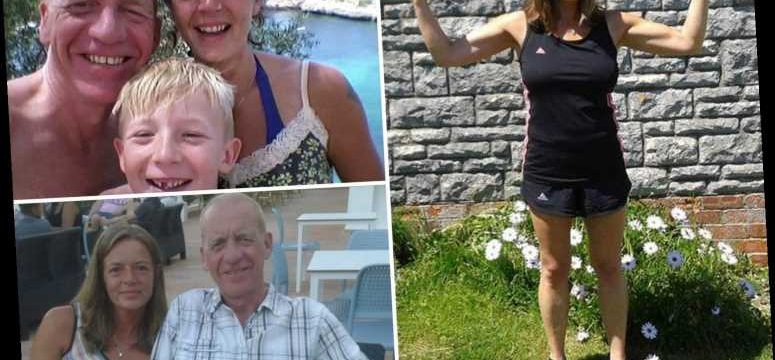A FIT and healthy mum has died suddenly just months after her husband was diagnosed with incurable cancer.
Sharon Bithell, 44, suffered an unexpected brain aneurysm 10 days before her death on Thursday.
The couple, from Southampton, had just celebrated their 20th anniversary and have a 12-year-old son named Harry.
Dave, 55, has been battling with an incurable stage four cancer, mantle cell lymphoma, since being diagnosed in December last year.
He is currently having chemotherapy with the hope to extend his life by up to a decade, but says he may only have a couple of years.
She was the love of my life and I thought we would have many years together still
The grieving widower told Birmingham Live:"I had the best years of my life with Sharon, we were best friends, we loved each other.
"I absolutely adored her, she was the love of my life and I thought we would have many years together still. We had hope for the future."
Heartbreaking tribute
Paying tribute to his wife, who is originally from Solihull, Dave said: "She was really lovely. She was liked by everyone, very popular.
"She was very fit and active and a fantastic mum to Harry.
"At work, she was like a mother figure to a lot of people that worked there.
"Aneurysms just come on really quickly, it can just happen like that – and it did – it just happened out the blue.
"We can't believe it's happened, I'm up and down like a yo-yo, one minute I'm alright, the next I'm in floods of tears. It's like a bad dream. It's the last thing we expected.
"Sharon was going to be the breadwinner when I was going through all my treatment, so we just didn't have any indication of this happening."
He described Sharon as being "fit as a flea".
She was airlifted to the hospital in Southampton after locals near their home saved her life with CPR.
What is a brain aneurysm and what are the symptoms?
An aneurysm is a bulge in a blood vessel caused by a weakness in the blood vessel wall, usually where it branches.
As blood passes through the weakened blood vessel, the blood pressure causes a small area to bulge outwards like a balloon.
Aneurysms can develop in any blood vessel in the body, but the two most common places are the artery that transports blood away from the heart to the rest of the body and the brain.
Most brain aneurysms only cause noticeable symptoms if they burst. Symptoms can include:
- a sudden agonising headache – it's been described as a "thunderclap headache", similar to a sudden hit on the head, resulting in a blinding pain unlike anything experienced before
- a stiff neck
- sickness and vomiting
- pain on looking at light
If a brain aneurysm is detected before it ruptures, treatment may be recommended to prevent it rupturing in future.
Most aneurysms do not rupture, so treatment is only carried out if the risk of a rupture is particularly high.
Exactly what causes the wall of affected blood vessels to weaken is still unclear, although risk factors have been identified. These include:
- smoking
- high blood pressure
- a family history of brain aneurysms
In some cases, an aneurysm may develop because there was a weakness in the walls of the blood vessels at birth.
The best way to prevent getting an aneurysm, or reduce the risk of an aneurysm growing bigger and possibly rupturing, is to avoid activities that could damage your blood vessels, including smoking, eating a high-fat diet, not controlling high blood pressure and being overweight or obese.
Source: NHS
"The people here are well-trained in first aid and were told that they saved her life by doing CPR and mouth to mouth," he said.
"The staff at the hospital said she wouldn't have survived if they hadn't have intervened.
"It was Sunday she went in and really we knew on the Wednesday that she wasn't going to survive, ten days later."
He cannot work while undergoing his cancer treatment, due to finish in July next year, so his parents and Sharon's parents have moved into the area to support them.
A GoFundMe appeal, which has hit more than £9,000, has also been launched in a bid to raise funds for the family.
Dave added: "[The cancer] is incurable so. At some point, I might go into remission.
"One of the consultants said to me: 'If you had this five years ago your chances of survival would be poor, but now its quite likely that we can give you another five years'.
"Maybe I might get ten years, I might get five – I might get two, we just don't know."
Source: Read Full Article





